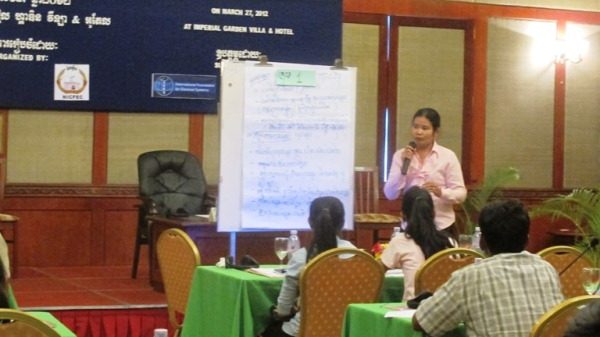By: Yusdiana, PPCI
Cambodian Disabled People Organization held a workshop on March 27 at the Imperial Hotel, Phnom Penh, to review the accessibility of the country’s election. In addition to the organization members that hailed from the provinces, the workshop was attended by representatives from the National Election Committee (NEC), Neutral and Impartial Committee for Free and Fair Election in Cambodia (NICFEC), the Committee for Free and Fair Election in Cambodia (COMFREL), as well as UNDP and IFES Cambodia.
The one day workshop was officially opened with a speech from NEC Under Secretary General Sokolak Tipor which highlighted measures that had been taken by the committee to facilitate voters with disability. According to him, polling stations had been equipped with ramps to improve their accessibility, while assistants and tactile ballot were provided to assist the voters. In the run-up to the commune election on June 3, the committee had also encouraged persons with disabilities to register as polling station attendants, a post that still offers a lot of openings .
This message was further emphasized by another committee memberwho spoke about the commune election and how persons with disability could get actively involved in every stage of the process.
CDPO Director Ngin Saorath, however, expressed skepticism about this heartening report. He said that his organization had found the polling stations to be poorly accessible. The ramp, for instance, was not in place when needed. The tactile ballot and assistant for voters who are blindwere also not consistently provided. Ngin especially questioned the confidentiality of votes cast at home by persons with disabilities with the assistance of a poll station attendant. Ngin believed such practice limits the voter’s independence. He therefore urged the election committee to give accessibility more consideration in order to provide better access for persons with disability to exercise their political rights .
Afterward, the participants were divided into three groups for discussion. The first group consisted of CSO and government representatives, while members of the other two came from disabled people organizations. The groups were set to discuss three topics: obstacles faced by persons with disabilities in giving their votes; ways to empower them to exercise their political rights, and lastly, recommendations to be made to the election committee to overcome the obstacles.
Through the discussion, the participants recognized problems arise both before and during the election. For instance, voters with disabilities often find it difficult to access information prior to the election. Political information is not available in braille. In addition, since many of the persons with disabilities live in remote rural areas, suggestions were made for dissemination of information through radio broadcast and mobile public advertisement using a car/motorcycle to drop the news to the people in the region.
The participants also commented on the voter registration system which had not been made available at accessible sites. This is due to the location of NEC office which is usually situated in an old building with staircases and no elevator. Compounding the issue was the view widely held by Cambodians that persons with disabilities are incapable of making decisions and thus ineligible to vote.
The participants also raised the issue of poor accessibility as an obstacle on election day. Apart from the technical problems mentioned by Ngin Saorath in the beginning, they also emphasized the need for more sensitivity on the part of polling station attendants with regards to disability issues. For instance they noted that the lack of signs at the polling stations and the inability of attendants to provide necessary information had made voting a challenging exercise for many deaf voters. In some cases disabled voters were asked to wait in a long line that made it difficult for them to be comfortable or sit before it was their turn to cast their ballot .
The participants agreed on the importance of adopting an election law that takes the political rights of persons with disabilities into consideration. The law would have to regulate such technical issues as assistive tools and guidelines on site selection and construction of accessible polling station. The participants also suggested that essential information on voting procedures and candidate background is provided at polling stations. They also acknowledged that voter education should include the message to society that persons with disabilities have as much political rights as other citizens .
The groups recommended the election committee to consider and facilitate persons with disabilities to work at polling stations. It is hoped that their participation would encourage other disabled voters to come and exercise their rights to vote .
In his closing speech, Under-Secretary General Sokolak Tipor again expressed NEC support for the issues raised in the discussions. While he acknowledged that currently persons with disabilities do not enjoy the same access that their able counterparts have, he guaranteed that the situation will change in the future. He said that he had taken notes of the recommendations made in the workshop and would bring them to the attention of NEC commissioners. Furthermore, he encouraged persons with disabilities to apply for the position of poll workers, since it would help NEC to get an inside view of what persons with disabilities require for an accessible election.
CDPO : Cambodia Disabled People Organization

